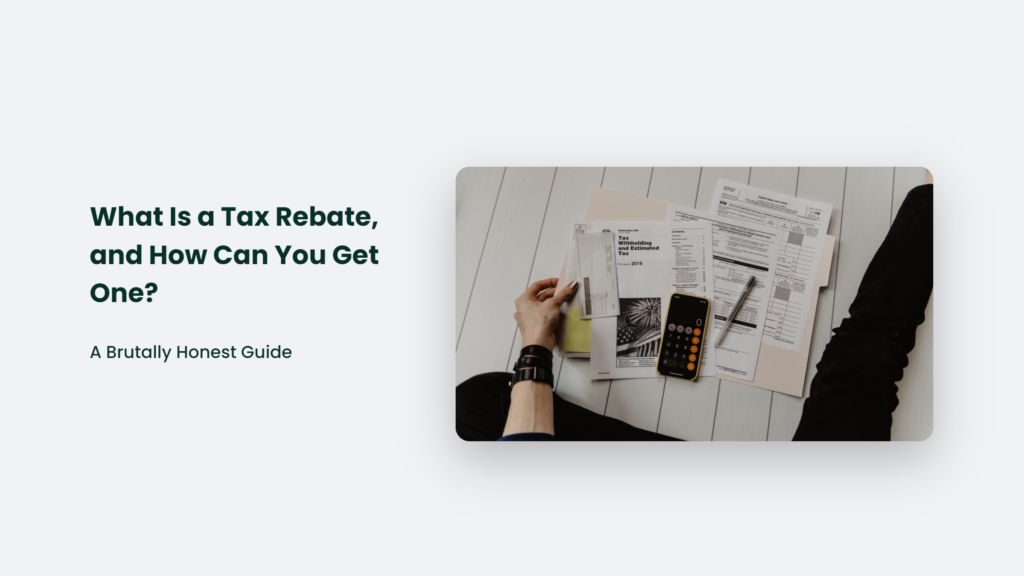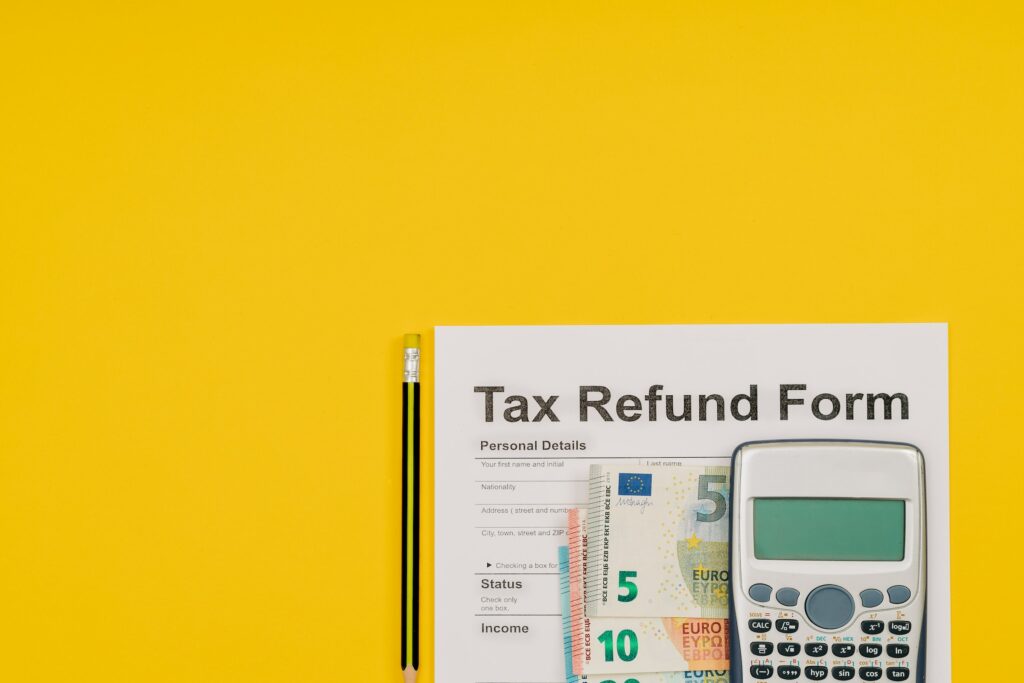Let’s be real here. Talking about taxes isn’t exactly fun or sexy. As much as I wish this article could be filled with hilarious tax puns that would make you laugh so hard you’d spit out your coffee, taxes are about as enjoyable as getting a root canal.
But alas, taxes are a necessary evil that we must deal with, like that one annoying coworker who microwaves fish in the office kitchen every day.
And in today’s challenging economic climate, many people seek ways to get some financial relief. It is where tax rebates come in.

What is a Tax Rebate?
A tax rebate is when you get a refund on taxes you’ve already paid. It’s like finding a $20 bill in your winter coat when you pull it out of storage. A surprise that puts a smile on your face.
More specifically, a tax rebate is a refund on taxes that were overpaid or paid when not required. For example, many people received a tax rebate in 2008 when the government issued stimulus checks to taxpayers. The goal was to encourage spending and boost the economy. Cha-ching!
Tax rebates can also apply to specific taxes like property taxes. Many municipalities offer property tax rebates to elderly or disabled homeowners. The rebate lowers the amount of tax they are required to pay.
Why Do Tax Rebates Exist?
There are a few key reasons why governments issue tax rebates:
- To stimulate the economy – Tax rebates are often used as economic stimulus measures during recessions. Sending taxpayers extra money is intended to boost consumer spending.
- To provide tax relief – Tax rebates can offer relief when taxes are reduced retroactively or if taxpayers overpaid taxes due to withholding errors.
- To incentivise behaviour – Rebates may be offered for eco-friendly purchases like electric vehicles or for investing in renewable energy systems. It incentivises desired behaviour.
- To aid specific groups – Some rebates assist elderly, disabled, or low-income homeowners by lowering their property tax burden.
Essentially, tax rebates put money back into the hands of consumers intending to benefit the overall economy or assist specific groups.
4 Common Types of Tax Rebates
Income Tax Rebates
- Issued by federal or state governments, usually during economic downturns, to stimulate consumer spending. For example, the 2008 federal stimulus checks.
- It can also come from overpayment of income taxes, either due to excess withholding or qualifying for retroactive tax credits. Taxpayers receive a refund.
Property Tax Rebates
- Offered by local municipalities to provide relief for certain homeowners facing economic hardship or high property tax burdens.
- Often target elderly, disabled, or low-income homeowners. Rebates lower their effective property tax rates.
Sales Tax Rebates
- State programs that reimburse sales taxes paid on certain purchases to promote economic development.
- For example, some states offer rebates for buying energy-efficient appliances or electric vehicles.
Excise Tax Rebates
- Rebates on federal and state excise taxes, like taxes on fuel, tobacco, or alcohol purchases.
- Governments may offer temporary rebates to stimulate consumer spending or provide tax relief.
- It can also apply to certain excise tax exemptions.
How Do I Get a Tax Rebate?
The first step is determining if you qualify for any tax rebate programs. Unfortunately, the government won’t just randomly send you a check for no reason (as much as we may want that).
Here are some of the most common ways people can get tax rebates:
Claim Tax Credits
One of the best ways to get a nice tax refund is to claim tax credits like:
- Earned Income Tax Credit (EITC)
- Child Tax Credit
- Education credits like the American Opportunity Credit
- Energy efficiency credits for home improvements
These programs allow you to reduce the amount of tax you owe directly. And if the credits exceed your total tax bill, the difference is refunded back to you. Cha-ching again!
File an Amended Return
Mistakes happen. If you realize you claimed deductions incorrectly, forgot to claim deductions, or simply paid too much in estimates, you can file an amended tax return to get a refund.
Just be aware that you typically only have 3 years to file an amended return for a refund. So don’t procrastinate too long!
Negotiate with the IRS
If you owe back taxes, you may be able to negotiate a tax rebate directly with the IRS through an “offer in compromise.” This allows you to settle your tax debt for less than the full amount owed. It’s like haggling with the IRS to lower your tax bill.
To qualify, you’ll need to prove you need the means to pay the full amount. But if approved, the remaining tax debt is forgiven.
It’s a pretty sweet deal.
Protest Your Property Tax Assessment
If your property taxes are too high, you can challenge the assessed value and lower your property tax bill. If successful, you may be eligible for a property tax refund.
Just be sure to research the rules in your state and be ready to provide evidence to support your case. The process differs by location.
Take Advantage of Tax Incentives
Federal, state, and local governments offer various tax rebate incentives for things like:
- Buying eco-friendly vehicles
- Making energy-efficient home improvements
- Investing in renewable energy systems
So, review what incentives might be available where you live. Then, make the eligible purchases and cash in on the savings.
Frequently Asked Questions:
How do I check the status of my tax rebate?
You can check the status of your federal tax refund on the IRS website or by using the IRS2Go mobile app. For state tax rebates, check your state revenue department’s website.
When will I get my tax rebate?
The IRS issues most federal refunds within 21 days, though some complex returns may take longer. State tax rebates vary. Check with your state revenue department for timelines.
Can my tax rebate be garnished?
Yes, your tax rebate can be garnished to pay certain outstanding debts like back taxes, child support, or student loans. The amount garnished depends on the type of debt.
Be an Informed Taxpayer
Taxes don’t have to be painfully boring. By understanding how to maximize credits, minimize liability, and take advantage of rebates, you can actually get excited about tax time.
It just takes a little effort to know how the tax code works and the specific rebate programs available to you. Knowledge is power when it comes to getting tax refunds.
So, do your homework, run the numbers, and ensure you get every tax rebate you deserve. Think of it as a fun tax scavenger hunt. You’ve got this!




